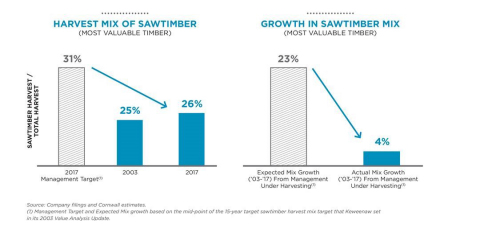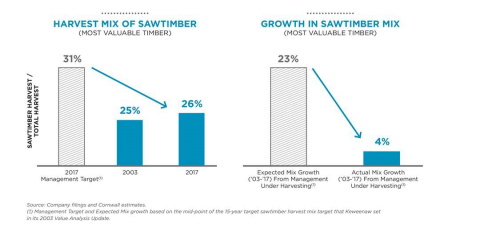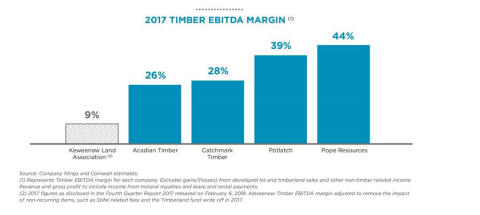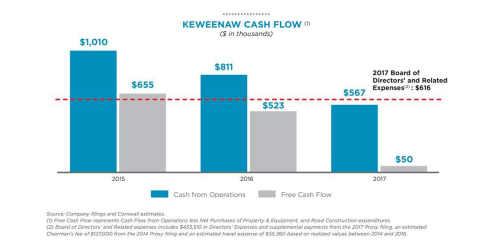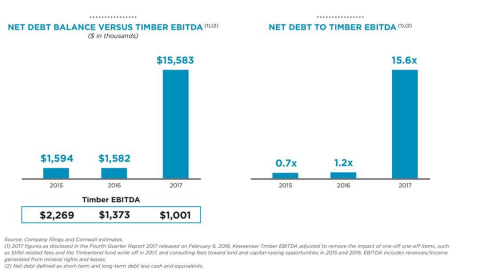NEW YORK--(BUSINESS WIRE)--Cornwall Capital Management, LP (“Cornwall”), an investment manager whose funds beneficially own approximately 26% of the outstanding shares of Keweenaw Land Association, Limited (OTC Pink: KEWL) (“Keweenaw” or the “company”), is today sending a letter to Keweenaw shareholders detailing the company’s significant operational underperformance due to its failed timber management strategy, excessive and unnecessary operating expenses, and reckless land acquisition strategy overseen by the incumbent directors.
In connection with Keweenaw’s Annual Meeting of Shareholders to be held April 12, 2018, Cornwall urges all shareholders to vote the WHITE proxy card TODAY “FOR” Cornwall’s three highly-experienced, independent nominees, who will act in the best interests of ALL shareholders by holding management accountable for their operational missteps and ensuring the company is put on a path towards operational excellence.
The full text of the letter is below and also available at: http://www.innisfreema.com/annual/KEWL/.
March 15, 2018
Fellow Keweenaw Shareholders,
Keweenaw Land Association, Limited’s (“Keweenaw” or the “company”) April 12th Annual Meeting is quickly approaching, and the company is at a crossroads: stay the course on a path of continued shareholder value destruction or add new directors to the board, who will bring fresh perspectives and catalyze meaningful change to increase value for all stakeholders.
I am requesting your support to ensure the latter: meaningful change through the election of Cornwall’s nominees – Mr. Ian Haft, Mr. Steve Winch, and Mr. Paul Sonkin – who have the required expertise and skill-set to right the ship at Keweenaw.
Given the board’s misguided strategy, Keweenaw operates at the bottom of its peer group on almost every operating metric imaginable. Over the past several years, Keweenaw’s lack of cash flow and continued pursuit of a reckless land acquisition strategy have also resulted in a significant increase in leverage, without any discernable benefit to the company.
Left unchecked, this trend could be disastrous for our company. It is clear that change is required at the board level in order to put Keweenaw back on a path towards success. As Keweenaw’s largest shareholder and a longstanding investor in the company, Cornwall’s interests are directly aligned with those of our fellow shareholders.
Accordingly, I strongly urge you to voice your opinion in this important election by voting the WHITE proxy card “FOR” Cornwall’s nominees, who if elected, will work alongside the incumbent Keweenaw directors to increase shareholder value at the company for the benefit of ALL shareholders.
KEWEENAW’S TIMBER MANAGEMENT STRATEGY HAS FAILED
For decades, Keweenaw has pursued a timber management strategy that involves under-harvesting in an attempt to upgrade timberland inventory and improve the value of the harvest in the future.
“The management program intends to increase the percentage of hardwood sawtimber [the most valuable timber] as a percentage of the overall harvest mix and correspondingly decrease the pulpwood product category [the least valuable timber] …Within the next 15 years, it is expected that sawtimber will represent 29%-32% of the harvest mix” (Pg. 5, 2003 Keweenaw Value Analysis Update)
To state more plainly, the company tells us the only reason for under harvesting (and thus sacrificing near-term cash flows) is to increase the mix of the most valuable timber (sawtimber) harvested at some point in the future. How has the company performed versus this goal? If Keweenaw’s timberlands grew by 0.65 cords per acre per year over the aforementioned 15-year period (consistent with data-points provided in company reports and appraisals), the company under harvested by an incredible 30%, sacrificing millions in revenue and cash flows.
In return for this sacrifice, the company should have seen a significant increase in the mix of valuable sawtimber logs that it sells. In fact, as highlighted above, management set a target that would imply valuable sawtimber mix grow by 23% (mid-point) through execution of this strategy. Instead, between 2003 and 2017, the mix of valuable sawtimber only grew by a mere 4%, missing its mix growth target by a staggering 84%. Given there are potentially irreversible damages to suppressing the availability of timber in its markets, Keweenaw should recognize that its timber management strategy was not successful and immediately stop under harvesting.
See: Harvest Mix of Sawtimber (Most Valuable Timber) and Growth in Sawtimber Mix (Most Valuable Timber) Graphic
Putting aside the missed harvest targets, the company might still argue that its strategy has been validated by the increases in standing timber values. This is misleading. In fact, the company recently completed its first comprehensive timber cruise in history, which resulted in a meaningful inventory restatement. As a result, any historical statements about inventory quality and quantity are inherently speculative, and if anything, would suggest the company is under-harvesting more than our previous figures have suggested.
KEWEENAW’S OPERATING EXPENSES ARE EXCESSIVE AND ONLY RISING
In 2017, Keweenaw spent just under $3,000,000 in operating expenses, excluding non-recurring expenses, such as capitalized costs in connection with its failed timberland fund and expenses related to the strategic review. On almost any metric relative to the scale of the company, this amount seems excessive when compared to peers. For example, in 2017, Keweenaw’s operating expenses were 25% of its revenues. On this same metric, Acadian Timber was at 10%, a fraction of Keweenaw’s ratio.
An example of Keweenaw’s excessive expenses is the amount the company spends on board and board-related expenses. In 2017 alone, we estimate that Keweenaw spent approximately $616,000 on board and board-related expenses. Not only is this figure high versus Keweenaw’s much larger peers, but it’s astounding when you consider it relative to the revenues of the company. These high expenses are driven in part by board meetings that have been frequently scheduled at popular tourist destinations – including Salt Lake City, Portland, Boston and Dallas – all of which are far away from the company’s corporate headquarters and in states where the company has no operations.
See: Board of Directors’ and Related Expenses / Total Revenue Chart
Not only are operating expenses excessive versus peers, but they have also been steadily rising without a corresponding increase in gross timber profit. In 2017, operating expenses consumed 79% of the company’s timber gross profit, thus contributing to the company’s peer lagging margins.
See: Keweenaw Operating Expenses Chart
With a misguided under-harvesting strategy and excessive expenses, it is not surprising that Keweenaw’s operating performance ranks at the bottom of any peer set.
See: 2017 Timber EBITDA Margin Chart
Furthermore, Keweenaw has very low cash flow and the company frequently spends as much on its board expenses as it generates from its cash flow from operations or its free cash flow. Simply put, our shared investment is being wasted on extraordinary and unnecessary corporate expenses.
See: Keweenaw Cash Flow Chart
KEWEENAW HAS EMBARKED ON A PERILOUS AND ILL-CONCEIVED ACQUISITION STRATEGY
A failed timber management strategy, coupled with excessive and rising operating expenses, has left the company generating de minimis cash flow. As the company has spent over $22,000,000 in land purchases over the past 5 years, with almost no corresponding free cash flow generation, the company has accumulated a dangerous amount of debt. In a testament to the capital allocation practices of the company, this increase in debt has NOT corresponded with any growth in its business.
See: Net Debt Balance Versus Timber EBITDA and Net Debt to Timber EBITDA Graphic
BOARD CHANGE IS REQUIRED TO RESOLVE KEWEENAW’S OPERATIONAL SHORTCOMINGS
Operational challenges have plagued Keweenaw for some time, and it is clear to us that the incumbent directors are taking no steps to change the status quo. Instead, the incumbent directors are watching on the sidelines as management continues to lead the company down a path of operational and financial destruction. Oversight and accountability are nowhere to be found.
As shareholders, we deserve better. We deserve directors who will act as true fiduciaries – directors who will hold management accountable for unnecessary corporate costs and ensure shareholders’ dollars are put to good use. Cornwall’s three highly-experienced nominees pledge to act in the best interests of ALL shareholders by holding management accountable for their operational missteps and ensuring these operational issues are resolved as swiftly as possible.
I strongly encourage you to protect your investment by voting “FOR” Cornwall’s nominees on your WHITE proxy card today.
Sincerely,
James A. Mai
Managing Member of Cornwall GP,
the General
Partner of Cornwall Master LP
Important Information:
In connection with its solicitation of proxies for the 2018 annual meeting of Keweenaw Land Association, Limited (the “Company”), Cornwall Capital Management, L.P. and certain of its affiliates (collectively, “Cornwall”) intend to make available additional information to the shareholders of the Company. CORNWALL STRONGLY ADVISES ALL COMPANY SHAREHOLDERS TO READ ALL ADDITIONAL INFORMATION WHEN IT BECOMES AVAILABLE BECAUSE IT WILL CONTAIN IMPORTANT INFORMATION.

